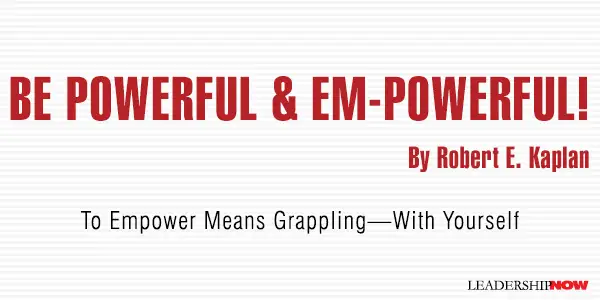 |
 |
12.20.24

Be Powerful & Em-Powerful!
EMPOWERMENT has turned into a buzzword that’s lost its meaning. We all know what being powerful—or, euphemistically, influential—looks like. But to be empowering—how clear is that? Worse than unclear, empowering is widely misunderstood. For forceful leaders, it’s seen as giving power away; giving power to your staff means giving up your power. It’s easy for forceful leaders to feel that granting power to others takes away from their own power or that they are somehow rendered “passive,” as one forceful leader put it. Power is simply a means to the end of getting things done. It shouldn’t matter whether it’s your power or “Other” power. You can grind grain into flour by your own hand using a mortar and pestle, which human beings learned to do at the dawn of agriculture. Or, as people discovered centuries later, you can spare yourself that manual labor and produce a lot more grain if you hitch horses or water or wind power to the mill. Three Types of Empowerment #1. Delegation. Delegation of authority is letting your people do their jobs. Delegation of authority is certainly not abdication. It’s taking an active role in arranging for some other source of power to be transmitted to the grinding stone. It is spooling out authority and then staying engaged to the degree necessary. #2. Taking counsel. Empowerment isn’t just granting power down. It’s also accepting power up. Because every leader is fallible—at risk of making costly errors of judgment—there is great merit in taking counsel from your people, selectively, of course. Perhaps your ego rebels just a bit, and you can’t help feeling that taking your team’s counsel on decisions that are yours to make is somehow a sign of weakness. Quite the contrary, within bounds, accepting power up actually extends your personal power. Done well, it fortifies your judgment—makes it stronger. #3. Picking strong players. To tap effectively into Other power, you must put strong, capable people on your team in the first place. You can only be as em-powerful as your people’s skills and energies allow. If you were deciding on a place to build a windmill, you’d settle for nothing less than a consistently windy place. Many leaders fail to put high-quality people on their team. Either they are poor judges of talent or, out of insecurity, they shy away from appointing the best people. Leaders may also fall down on the back end of staffing out of misplaced loyalty or being afraid to let go of people who’ve lost effectiveness or who turn out not to be good picks. To Empower Means Grappling—With Yourself Do you recoil at the idea of sharing power, thinking, “Never. I’d be a wimp?” Indeed, empowerment is sometimes viewed as “soft” and, therefore, something to be avoided if you want to be a strong leader and you want to be viewed that way. If that’s what you believe, you’ll never be good at empowerment. Likewise, if you fear that empowering others makes you a managerial weakling. That prejudice, that fear, stands in your way. To get it out of the way means grappling with yourself because it isn’t always easy to correct an entrenched belief or allay an unwarranted fear. Why not see your way clear to be both powerful and empowerful? It’s a struggle with yourself well worth waging. (For more on that subject, see my new book, GRAPPLING: Leaders Striving To Be Better, short stories that bring executive coaching to life.) Why not have both sources of power fully available to you, direct and indirect power. However naturally powerful you are—however well you take charge, make decisions in a timely way, set high expectations, and hold people accountable—it pays big-time to also be em-powerful. That way, you extend your power and amplify your impact. What’s more, you afford other people the opportunity for one of life’s deepest satisfactions—to use their powers fully.  
Posted by Michael McKinney at 08:29 AM
|
BUILD YOUR KNOWLEDGE
 

How to Do Your Start-Up Right STRAIGHT TALK FOR START-UPS 
Grow Your Leadership Skills NEW AND UPCOMING LEADERSHIP BOOKS 
Leadership Minute BITE-SIZE CONCEPTS YOU CAN CHEW ON 
Classic Leadership Books BOOKS TO READ BEFORE YOU LEAD |